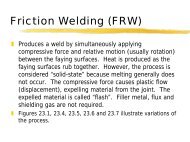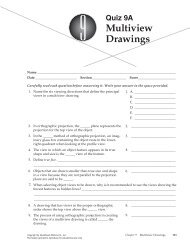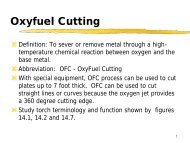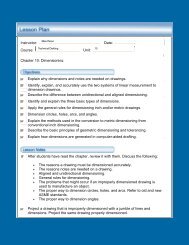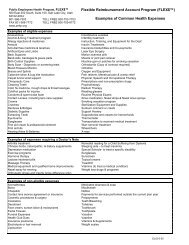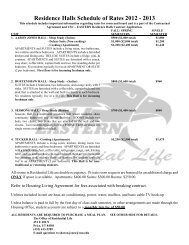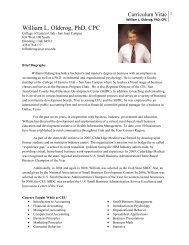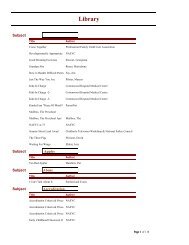On-Line Career Exploration - College of Eastern Utah
On-Line Career Exploration - College of Eastern Utah
On-Line Career Exploration - College of Eastern Utah
You also want an ePaper? Increase the reach of your titles
YUMPU automatically turns print PDFs into web optimized ePapers that Google loves.
<strong>Career</strong> Advising<br />
<strong>On</strong>-<strong>Line</strong> <strong>Career</strong> <strong>Exploration</strong><br />
Making Sense <strong>of</strong> the World <strong>of</strong> Work: The Holland Code<br />
What is the Holland Code? The Holland Code is a strategy for organizing information about the three "worlds" <strong>of</strong> career planning: World <strong>of</strong> Self, World <strong>of</strong><br />
Work, and World <strong>of</strong> Education.<br />
How does it work? There are six general themes (see below) which can be used to describe people, jobs, and educational environments. Since people and<br />
environments are complex, it usually takes 2 or 3 themes to describe them.<br />
Over 12,000 occupations have been coded using this method. These codes are based on statistical analyses <strong>of</strong> data collected over a long period <strong>of</strong> time involving<br />
very large numbers <strong>of</strong> people. Read below to informally assess your Holland Code. As you go through the process <strong>of</strong> thinking about which themes describe you<br />
the best, you will be doing one <strong>of</strong> the most important parts <strong>of</strong> the career planning process - trying to understand and define yourself.<br />
WHICH THREE THEMES DESCRIBE YOU BEST?<br />
REALISTIC<br />
<strong>Career</strong> Motivator: Using Physical Skill<br />
• Values work with tools and objects rather than with people and words<br />
• Wants to see practical results from their work<br />
• Likes a physical or outdoor component<br />
• Acquires technical, mechanical, athletic skill<br />
• Apt to be reserved, traditional, concrete, genuine; <strong>of</strong>ten cool to radical<br />
new ideas and creative arts<br />
Typical jobs: engineer, forester, farmer, skilled laborer, truck driver, pilot,<br />
soldier, aircraft mechanic, protective services, technical fields<br />
CONVENTIONAL<br />
<strong>Career</strong> Motivator: Organizing<br />
• Values accuracy, organization,<br />
company policy, practicality, security,<br />
stability, dependability<br />
• Likes to process data, manage<br />
information, collect things, play board<br />
games, work with numbers<br />
• Apt to be orderly, careful, thrifty,<br />
respectful, efficient, persevering<br />
Typical jobs: banker, accountant, credit<br />
manager, actuary, building inspector, IRS<br />
agent, paralegal, pro<strong>of</strong>reader<br />
Order<br />
ENTERPRISING<br />
<strong>Career</strong> Motivator: Persuading and Influencing<br />
• Values risk-taking, status, competition<br />
• Enjoys selling, managing, persuading<br />
• Apt to be ambitious, competitive, persuasive, self-confident,<br />
goal-directed, fast-paced<br />
Typical jobs: HR director, life insurance salesperson, manager, buyer,<br />
financial planner, marketing executive, realtor, politician, caterer, CEO (or<br />
want-to-be's)<br />
C<br />
Data<br />
R<br />
Things<br />
E People<br />
2<br />
I<br />
S<br />
INVESTIGATIVE<br />
<strong>Career</strong> Motivator: Analyzing<br />
• Values math, scientific inquiry, intellectual effort<br />
• Wants to understand and predict physical, biological, or<br />
cultural phenomena and practices<br />
• Likes to work with theories, do research, test ideas<br />
• Apt to be analytical, cautious, independent, curious,<br />
introspective, critical, studious<br />
Typical jobs: psychologist, chemist, veterinarian, geneticist,<br />
college pr<strong>of</strong>essor, social scientist, geologist, dentist, curator,<br />
dietician, physician, statistician, systems analyst<br />
Ideas<br />
A<br />
Creative<br />
ARTISTIC<br />
<strong>Career</strong> Motivator: Expressing Creativity<br />
• Values independence, self-expression,<br />
unstructured methods, new ways <strong>of</strong> doing<br />
things, aesthetic beauty<br />
• Use creativity, imagination, intuition<br />
• Appreciates the artistic work <strong>of</strong> others in<br />
museums, theaters, and books<br />
• Apt to be open, impractical, original,<br />
nonconforming, sensitive, idealistic,<br />
complicated, expressive<br />
Typical jobs: artist, musician, writer,<br />
architect, reporter, librarian, English/art<br />
teacher, lawyer, corporate trainer, translator,<br />
sociologist, broadcaster<br />
SOCIAL<br />
<strong>Career</strong> Motivator: Helping Others<br />
• Values helping, nurturing, caring for others<br />
• Uses human relations competencies<br />
• Prefers social context, seek personal meaning<br />
• Apt to be agreeable, cooperative, friendly, warm, patient, tactful,<br />
responsible<br />
Typical jobs: elementary school teacher, high school counselor, social<br />
worker, nurse, recreation leader, minister, physical therapist, midwife,<br />
school administrator
Use to compare and contrast occupations or majors using SIR/TV factors.<br />
SIR/TV Decision-Making Matrix<br />
Directions:<br />
1. Complete steps 1 - 4 in the table below<br />
2. Use 0*NET <strong>On</strong><strong>Line</strong> (www.onetonline.org) and FOCUS eastern.usu.edu/career found in the "Great Resources" section) for<br />
your research.<br />
3. Self-awareness is an on-going process; change your ratings if the rankings don't feel right.<br />
4. If you have a tie in total ratings, make a choice between the two and rank the tie so you don't have two careers with the<br />
same ranking.<br />
5. If you aren't clear about your feelings, this is an indicator that you need more information either about yourself, about the<br />
option, or both.<br />
Step 1. Identify five <strong>Career</strong>s/Majors you are interested and list them in the row below.<br />
<strong>Career</strong>s or Majors -> 1. 2. 3. 4. 5.<br />
Step 2. Research each factor (Skills, Interests, Realities, Temperament, and Values) typically associated with the<br />
careers/majors listed in Step 1 using Focus and O*NET <strong>On</strong>line. Then rate each factor 1 – 5 (1 = “not a good fit” and 5 =<br />
“perfect fit”). Put ratings in the boxes below.<br />
Skills: Do you have or can you learn the<br />
skills required? Consider the skills you<br />
prefer using.<br />
Interests: Do you have a history <strong>of</strong><br />
interest in this area or a related area<br />
(preference for working with people,<br />
things, ideas, data)?<br />
Realities: Factors outside <strong>of</strong> you which<br />
influence your decision: time to<br />
graduate, salary, family, advancement,<br />
labor market (Look at Outlook, Earnings,<br />
& Areas <strong>of</strong> Study)<br />
Temperament: Personality traits: i.e.<br />
creative, practical, extrovert, logical,<br />
etc. (Look at Working Conditions).<br />
Work Values: Prestige, variety,<br />
creativity, leadership, high<br />
achievement, physical activity,<br />
purposeful, independence, work with<br />
mind<br />
Step 3. Add your scores<br />
Step 4. Rank your results<br />
(highest: 1 st - lowest: 5 th )<br />
3
GOAL:<br />
Activities to Help Me Reach My Goal<br />
Individual <strong>Career</strong> Action Plan<br />
People or Information Resources Needed<br />
4<br />
Date






